高一英语下册 Unit20《Humour》说课稿4 人教版
高中英语 A taste of English humour公开课教案 新人教版必修4
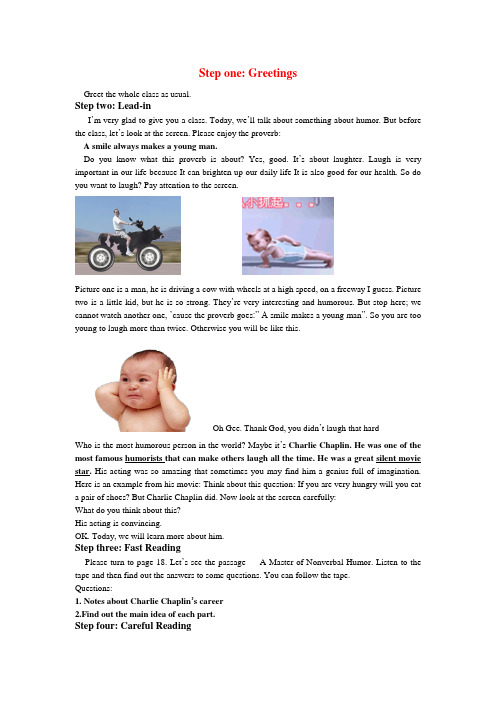
Step one: GreetingsGreet the whole class as usual.Step two: Lead-inI’m very glad to give you a class. Today, we’ll talk about something about humor. But before the class, let’s look at the screen. Please enjoy the proverb:A smile always makes a young man.Do you know what this proverb is about? Yes, good. It’s about laughter. Laugh is very important in our life because It can brighten up our daily life It is also good for our health. So do you want to laugh? Pay attention to the screen.Picture one is a man, he is driving a cow with wheels at a high speed, on a freeway I guess. Picture two is a little kid, but he is so strong. They’re very interesting and humorous. But stop here; we cannot watch another one, ’cause the proverb goes:” A smile makes a young man”. So you are too young to laugh more than twice. Otherwise you will be like this.Oh Gee. Thank God, you didn’t laugh that hardWho is the most humorous person in the world? Maybe it’s Charlie Chaplin.He was one of the most famous humorists that can make others laugh all the time. He was a great silent movie star. His acting was so amazing that sometimes you may find him a genius full of imagination. Here is an example from his movie: Think about this question: If you are very hungry will you eat a pair of shoes? But Charlie Chaplin did. Now look at the screen carefully:What do you think about this?His acting is convincing.OK. Today, we will learn more about him.Step three: Fast ReadingPlease turn to page 18. Let’s see the passage --- A Master of Nonverbal Humor. Listen to the tape and then find out the answers to some questions. You can follow the tape.Questions:1. Notes about Charlie Chaplin’s career2.Find out the main idea of each part.Step four: Careful ReadingThrough fast reading we’ve known the main idea about this passage. Now let’s understand the text paragraph by paragraph.Para one: Read this paragraph together, and then find out the answer to the question.What effect does Charlie Chaplin's acting have?He made people laugh at a time when they felt depressed, so they could feel more content with their lives.Part two: Let the students read it silently, then answer the following questions.1. When was he taught to sing and dance?As soon as he could speak and walk.2. How did he spend his childhood after his father died?He spent his time looking after his mother and his brother.Part three: Listen to the tape, and then answer the questions.Can you give a description on the little tramp?Large trousers, worn-out shoes, small round black hat and a walking stickAll his appearance makes the little tramp a poor and homeless personPara four: Listen to the tape of paragraph four, and then answer questions.1. Read Para 4 and answer the questions about The Gold Rush.Time:In the middle of the 19th century Place:California2. Can you put them in a right order?a. Cut off the leather top of the shoe 3b. Pick out the laces and eat them 2c. Try cutting and eating the bottom of the shoe 4d. Sit down at the table. 1Para five: Read it together, and then fill in the blanks.Step five: DiscussionFrom this passage, we can see that Charlie Chaplin is a successful actor. Now think about this: why was he so successful? What should we learn from him?Step six: Sum-upFrom what you said, we can conclude some reasons for his success. Firstly, determination: from the passage we know that when he was a child he has made up his mind to be a good actor. Secondly, he is the underdog just like his famous character—the little tramp. His miserable childhood makes him have a strong sympathy to the poor. And just as the little tamp did, he is optimistic to life and also, his devotion to his career plays an important part in his success. More over, He is kind; from his works we can see that.I think these are what we should learn from himStep seven: HomeworkWrite a composition about Charlie Chaplin in English for the local newspaper.Related website: http://www.Charlie 。
Unit20Humour课件大纲人教版课件.ppt

(2)我仔细地看了这篇文章,了解到那是为农村妇女写的。 I looked carefully at the text and realized that it ________________________women in the countryside. 答案: was intended for
certain adj.肯定的;无疑的;某(种) 教材原句P52:Funny plays often have characters that are stereotypes of nationalities or people doing certain jobs.
①Mr Jackson is certain of his success. 杰克逊先生确信自己会成功。 ②We are not certain whether there is a regular bus service along the route.我 们不确定沿这条线路是否有公交班车。 ③It is certain to be healthy and safe for people’s health. 它肯定是健康而安全的。 ④For a certain reason,he didn’t attend the meeting. 因某种原因他没参加会议。
intend vt.打算;计划;意指 教材原句P52:I intend to...
①My girlfriend and I intend to get married next year. 女朋友和我打算明年结婚。 ②I intend Tom to go to the concert with me. 我打算让汤姆跟我一块去听音乐会。 ③I intend that John should go and help them with their work. 我的意思是要约翰去帮助他们工作。
2019-2020年高一英语下册 Unit20 Humour(备课资料)教案 大纲人教版第一册
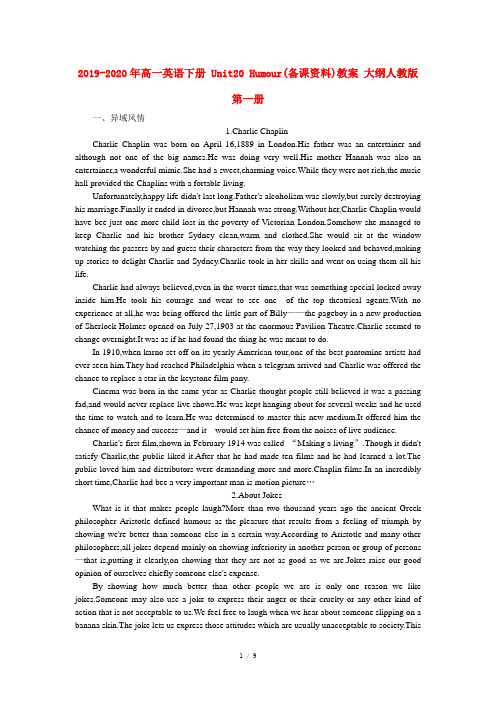
2019-2020年高一英语下册 Unit20 Humour(备课资料)教案大纲人教版第一册一、异域风情1.Charlie ChaplinCharlie Chaplin was born on April 16,1889 in London.His father was an entertainer and although not one of the big names.He was doing very well.His mother Hannah was also an entertainer,a wonderful mimic.She had a sweet,charming voice.While they were not rich,the music hall provided the Chaplins with a fortable living.Unfortunately,happy life didn't last long.Father's alcoholism was slowly,but surely destroying his marriage.Finally it ended in divorce,but Hannah was strong.Without her,Charlie Chaplin would have bee just one more child lost in the poverty of Victorian London.Somehow she managed to keep Charlie and his brother Sydney clean,warm and clothed.She would sit at the window watching the passers-by and guess their characters from the way they looked and behaved,making up stories to delight Charlie and Sydney.Charlie took in her skills and went on using them all his life.Charlie had always believed,even in the worst times,that was something special locked away inside him.He took his courage and went to see one of the top theatrical agents.With no experience at all,he was being offered the little part of Billy——the pageboy in a new production of Sherlock Holmes opened on July 27,1903 at the enormous Pavilion Theatre.Charlie seemed to change overnight.It was as if he had found the thing he was meant to do.In 1910,when karno set off on its yearly American tour,one of the best pantomine artists had ever seen him.They had reached Philadelphia when a telegram arrived and Charlie was offered the chance to replace a star in the keystone film pany.Cinema was born in the same year as Charlie thought people still believed it was a passing fad,and would never replace live shows.He was kept hanging about for several weeks and he used the time to watch and to learn.He was determined to master this new medium.It offered him the chance of money and success—and it would set him free from the noises of live audience.Charlie's first film,shown in February 1914 was called “Making a living”.Though it didn't satisfy Charlie,the public liked it.After that he had made ten films and he had learned a lot.The public loved him and distributors were demanding more and more.Chaplin films.In an incredibly short time,Charlie had bee a very important man is motion picture…2.About JokesWhat is it that makes people laugh?More than two thousand years ago the ancient Greek philosopher Aristotle defined humous as the pleasure that results from a feeling of triumph by showing we're better than someone else in a certain way.According to Aristotle and many other philosophers,all jokes depend mainly on showing inferiority in another person or group of persons —that is,putting it clearly,on showing that they are not as good as we are.Jokes raise our good opinion of ourselves chiefly someone else's expense.By showing how much better than other people we are is only one reason we like jokes.Someone may also use a joke to express their anger or their cruelty or any other kind of action that is not acceptable to us.We feel free to laugh when we hear about someone slipping on a banana skin.The joke lets us express those attitudes which are usually unacceptable to society.Thisis probably the reason why some of the jokes,especially those involving cruelty or sex,are so poplular with certain people.In addition,all jokes depend on our enjoy ment of laughing at something that is strange and out of place because it's different from things which are happening around it.The same situation can be either sad or pleasant,depending entirely on how strange and out of place it is.If a girl in a bathing-dress falls into a swimming pool,we don't laugh because nothing unusual has happened.But if a man in smart suit falls in,the situation is at once unusual in a pleasant way and we laugh.A good joke-teller will always try to build up a situation in which one thing is expected until something unexpected suddenly happdened,and so we laugh.二、知识归纳(一)with的用法归纳(1)表示“和……一起”。
Unit20Humor(人教版高一英语下册教案教学设计)
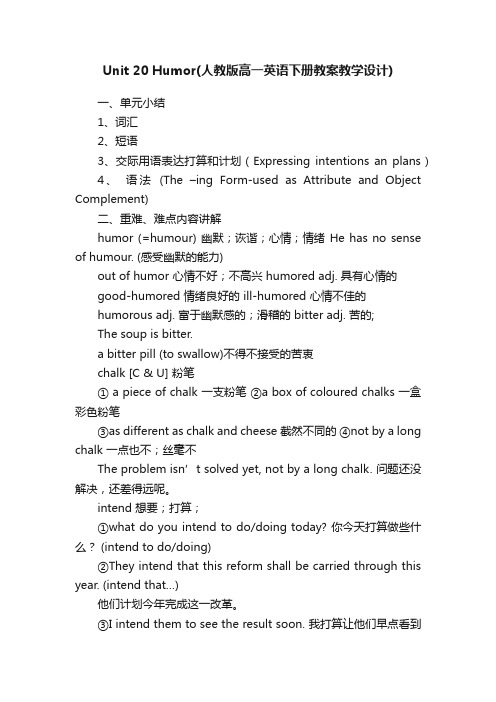
Unit 20 Humor(人教版高一英语下册教案教学设计)一、单元小结1、词汇2、短语3、交际用语表达打算和计划(Expressing intentions an plans)4、语法(The –ing Form-used as Attribute and Object Complement)二、重难、难点内容讲解humor (=humour) 幽默;诙谐;心情;情绪 He has no sense of humour. (感受幽默的能力)out of humor 心情不好;不高兴 humored adj. 具有心情的good-humored 情绪良好的 ill-humored 心情不佳的humorous adj. 富于幽默感的;滑稽的 bitter adj. 苦的;The soup is bitter.a bitter pill (to swallow)不得不接受的苦衷chalk [C & U] 粉笔① a piece of cha lk 一支粉笔②a box of coloured chalks 一盒彩色粉笔③as different as chalk and cheese 截然不同的④not by a long chalk 一点也不;丝毫不The problem isn’t solved yet, not by a long chalk. 问题还没解决,还差得远呢。
intend 想要;打算;①what do you intend to do/doing today? 你今天打算做些什么? (intend to do/doing)②They intend that this reform shall be carried through this year. (intend that…)他们计划今年完成这一改革。
③I intend them to see the result soon. 我打算让他们早点看到结果。
高一英语教案:Unit20Humour

Unit 20Humour
第1课时课型New
教学目的:Students are asked
a.to lear n some new words and expressi on
b.to study the Ian guage point
c.to deal with Warming up
重点:
To thi nk about what facial expressi ons mea n and how we in terpret them
I thought I thought
7.She sells seashells by the seashore. The shells she sells are surely
seashells. So if she sells shells on the seashore, I'm sure she sells seashore shells.
难点:
To thi nk about what facial expressi ons mea n and how we in terpret them
教学方法:
Five-step methods
教具(试验器材)
Multi-in strume ntsa tape record
板书设计:
Unit20Humour
3If white chalk chalks white on a blackboard, will black chalk chalk black on a white
4How many cans can a canner can if a canner can can cans? A canner can can as many cans as a canner can if a canner can can cans.
Unit20Humourwholeunit(人教版高一英语下册教案教学设计)

Unit20Humourwholeunit(人教版高一英语下册教案教学设计)Teaching goals1. Talk about humour and comedians2. Practice saying tongue twisters3. Express intensions and plans4. Learn to use the –ing Form (1) as Atrribute and Object Complement5. Write a funny story or joke in EnglishPeriod 1 Word study1. Homour/humor(1) amusement 幽默;诙谐;幽默感He has no sense of humour. 他没有幽默感。
(2) person’s state of mind; temper 心情,心境My daughter is in a good humour today. 我女儿今天很高兴。
(3) v. 使满足;迁就When a person is ill he may have to be humored.一个人生病时,被人都的迁就他。
out of humour 不高兴;心情不好humourous adj. 幽默感的,诙谐的2. bitter adj. 苦的;难过的;痛苦的The soup is bitter.His failure to pass the examination was a bitter disappointment.他考试失败是一件极令人失望的事。
a bitter pill to swallow 苦药丸;勉强接受的苦事to the bitter end 到底;拼命take the bitter with the sweet 甘与苦都接受bitterly adv. 苦涩地 bitterness n. 苦味3. comedy 喜剧 tragedy 悲剧comedian 喜剧演员;行动滑稽的人comedienne 喜剧中的女演员;女丑角He prefers comedy to tragedy.Comedians often work alone or as a pair.Song Dandan is a popular comedienne.4. intend v. ---have in mind as a purpose or plan 打算;意欲intend to do sth 打算做…intend that… 打算;intend sb to do sth 想让某人做某事be intended for 是为…设计的intend to have done sth. 本想做某事(而没做)intention n. 意图;目的;意旨1.你今天打算做什么?.2.他们计划今年完成这一工程。
高一英语Unit 20 Humor人教版知识精讲.doc
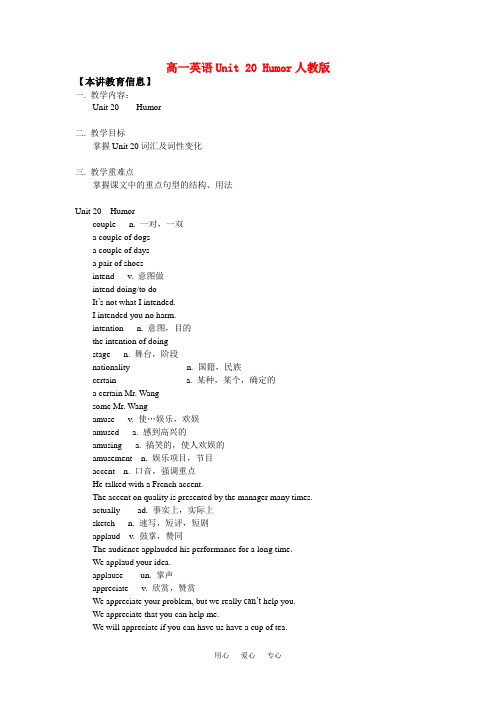
高一英语Unit 20 Humor人教版【本讲教育信息】一. 教学内容:Unit 20 Humor二. 教学目标掌握Unit 20词汇及词性变化三. 教学重难点掌握课文中的重点句型的结构、用法Unit 20 Humorcouple n. 一对,一双a couple of dogsa couple of daysa pair of shoesintend v. 意图做intend doing/to doIt’s not what I intended.I intended you no harm.intention n. 意图,目的the intention of doingstage n. 舞台,阶段nationality n. 国籍,民族certain a. 某种,某个,确定的a certain Mr. Wangsome Mr. Wangamuse v. 使…娱乐,欢娱amused a. 感到高兴的amusing a. 搞笑的,使人欢娱的amusement n. 娱乐项目,节目accent n. 口音,强调重点He talked with a French accent.The accent on quality is presented by the manager many times.actually ad. 事实上,实际上sketch n. 速写,短评,短剧applaud v. 鼓掌,赞同The audience applauded his performance for a long time.We applaud your idea.applause un. 掌声appreciate v. 欣赏,赞赏We appreciate your problem, but we really can’t help you.We appreciate that you can help me.We will appreciate if you can have us have a cup of tea.fluent a. 流利的fluency n. 流利with fluencydate back todate fromup to dateto dateout of dateput a date to sth.under the date of may 1stexist v. 存在existence n. 存在in existencesuffer v. 遭受suffer from headachessuffer pain/defeatsuffering n. 痛苦(通常复数)operate v. 操作,动手术operate on sb.drive offfortunate a. 幸运的fortune n. 好运by a stroke of fortunemake a fortuneconfuse v. 使迷惑,困惑confusing a. 使人迷惑的,令人费解的confused a. 感到困惑的confusion n. 困惑in confusiondirection n. 方向,说明书in a northerly directionsilence n. 沉默不语silent a. 沉默的silent,quiet与calmsilent指人或动物不发声,不做声。
高一英语下学期Unit 20a
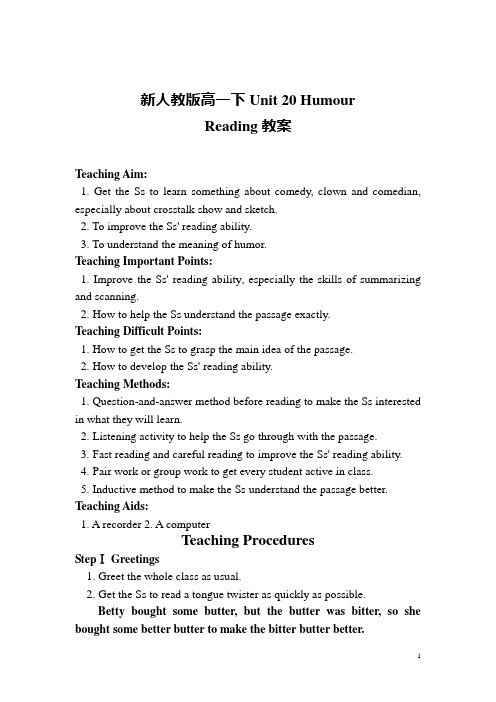
新人教版高一下Unit 20 HumourReading教案Teaching Aim:1. Get the Ss to learn something about comedy, clown and comedian, especially about crosstalk show and sketch.2. To improve the Ss' reading ability.3. To understand the meaning of humor.Teaching Important Points:1. Improve the Ss' reading ability, especially the skills of summarizing and scanning.2. How to help the Ss understand the passage exactly.Teaching Difficult Points:1. How to get the Ss to grasp the main idea of the passage.2. How to develop the Ss' reading ability.Teaching Methods:1. Question-and-answer method before reading to make the Ss interested in what they will learn.2. Listening activity to help the Ss go through with the passage.3. Fast reading and careful reading to improve the Ss' reading ability.4. Pair work or group work to get every student active in class.5. Inductive method to make the Ss understand the passage better. Teaching Aids:1. A recorder2. A computerTeaching ProceduresStepⅠ Greetings1. Greet the whole class as usual.2. Get the Ss to read a tongue twister as quickly as possible.Betty bought some butter, but the butter was bitter, so she bought some better butter to make the bitter butter better.Step Ⅱ Lead-in1. Tell the Ss: Today we'll learn a new unit, Unit 20 Humor. From the title, we can guess this unit will be much more interesting, for everyone likes fun, and every fun can make us happy and cheerful. Before learning it, let's enjoy a sketch. Later, answer two questions about it.1). Do you know who the comedians are?2). Do you know what makes them funny?2. Teacher shows the Ss some pictures on the screen and asks them some questions according to the pictures.1). How do we call these persons in these pictures?2). What are they performing?3). What do these actors usually perform?Step Ⅲ Pre-reading1. T: So much for this. Now let's look at some pictures of famous actors on the screen. Do you know who they are, and what makes them funny?1). Picture 1: The thin one is called Stan Laurel, while the fat one is called Oliver Hardy. They are funny because they are opposites. One is fat and one is thin. One is clever and one is silly.2). Picture 2: Mr. Bean is funny because he makes funny faces, he acts silly, he seems to be quite stupid, and the things he does are strange. 3). Picture 3: Dustin Hoffman is funny because he likes cross-dressing. He acts the role of a woman in the film Tootsie. In this film his performance is so good that you can't tell the difference and there are all kinds of funny moments.4). Picture 4: Ma Ji is a well-known artist of crosstalk shows in China. He is funny because his crosstalk shows always make people roar with laughter.2. Get the Ss to know some more famous artists in China. (Show the screen.)Step Ⅳ Reading1. Get the Ss to study Reading. First listen to the tape, then work in groups to divide the passage into four parts and find out the topic sentence of each part. (Show the screen.)Part 1(Para 1): Comedies are theatre plays that make people laugh. Part 2(Para 2): Clowns also make people laugh.Part 3(Para3): Another type of people whose job is to make peoplelaugh are comedians.Part 4(Para 4-5): Typical for China is the crosstalk show.2. Let the Ss learn some detailed information about the four topics. 1). Part 1: ComedyFill in the blanks according to Part 1.Comedies are those t______ plays that make people l______.Comedies make people laugh by c______ men and women appearing on the stage and by f______ plays with stereotypes of nationalities or people doing certain jobs. The actors also make us laugh by making fun of others' way of d______ or telling an a______ story. It sounds funny to hear foreigners speak with an a______. Comedies also play on words to c______ fun.2). Part 2: Clown(1). What is a clown?They often act alone or as a pair and make a different kind of fun.(2). How do they make people fun?a). By not using any words at all.b). By using their clothes, make-up and the way they walk.c). By helping people forget their problems, at least for a shortmoment.3). Part 3: Comedian(1). How do comedians make people laugh?a). By body language and their face.b). By acting out a situation--- a sketch.c). By using word play.(2).What's the most important thing in a comedian's job?The most important thing is not only to make people laugh, but also to get them to think about life.4). Part 4: Chinese crosstalk show(1). Which techniques are used by the artists in a crosstalk show?a). Making many jokes and funny conversations.b). Dressing up a little or acting out small sketches.c). Using rhythm and rhyming words.d). Using tongue twisters.(2). Get the Ss to enjoy a crosstalk show, then ask them some questions on the screen.a). Can you tell us who the famous comedian is in the crosstalk show? Do you like him? Why?b). Which techniques are used by the artists in the crosstalk show? Step Ⅴ Post-readingAsk some Ss to answer the questions about the passage. (Show the screen.)1). How long has the tradition of crosstalk existed in China?The tradition of crosstalk has existed in China for more than 2,000 years.2). Give three examples of techniques that writers of comedies often use to make people laugh.(1). cross-dressing (2). stereotypes (3). word play3). Why are some of Shakespeare's comedies not so funny for us?Some of Shakespeare's plays are not so funny for us because the meaning of words in English has changed and we don't understand the language and word play that Shakespeare used.Step Ⅵ ConsolidationGet the Ss to do the exercise of “True” or “False”. (Show the screen.) ( ) 1. Cross-dressing means men dressed up as women and women as men.( ) 2. Word play creates fun by using a word or phrase that has two meanings or words having the same sound but different meanings. ( ) 3. Shakespeare's plays are no longer funny because English has greatly changed.( ) 4. Clowns usually make people laugh by what they look and whatthey do, not by what they say.( ) 5. Clothes, body language, facial expressions and word play are all very important in comedians' shows.( ) 6.As far as we know crosstalk has never been shown by only one comedian or more than two comedians.( ) 7. Crosstalk can only be found in China and few foreigners know about this Chinese art form.( ) 8. Fluent spoken Chinese is a must for one who intends to be a crosstalk comedian.Ss: 1.T 2.T 3.T 4.T 5.F 6.F 7.F 8.TStep Ⅶ ActingInvite some Ss to act out a sketch in English.Step Ⅷ Summary and HomeworkT: Today we've learned a passage about Laughing Matter. It includes four topics. They are comedy, clown, comedian, Chinese crosstalk show. I think you must be very familiar with them. Look at today's homework.Homework1. Revise what we've learned today and try to retell the passage.2. Make a summary of the passage.3. Do Post-reading Ex. 1 (3,4,5).4. Work in groups to act out a crosstalk show and a sketch.课后反思:本节课我较好地完成了所设定的教学目标和教学内容,通过看录像和运用多媒体图片,由图到文,逐步讲解,使学生由感性认识上升到理性认识,加深理解,突破教学的重点难点。
- 1、下载文档前请自行甄别文档内容的完整性,平台不提供额外的编辑、内容补充、找答案等附加服务。
- 2、"仅部分预览"的文档,不可在线预览部分如存在完整性等问题,可反馈申请退款(可完整预览的文档不适用该条件!)。
- 3、如文档侵犯您的权益,请联系客服反馈,我们会尽快为您处理(人工客服工作时间:9:00-18:30)。
高中英语第一册(下)unit 20Humor说课稿
各位专家,各位领导,各位老师:
你们好,,很高兴有机会向各位讨教,希望大家能够批评指正,我说课的题目是高中英语第一册(下)第20单元Humor(幽默),下面是我对教材的分析。
一、教材的地位及作用
高中英语新教材的风格走势为话题时尚,面对未来,求异思维和人文色彩浓重,教学内容更加贴近现代生活,具有较强的时代信息,有利于提高学生的思想素质和人文素质,而本单元也是如此,本单元的中心话题是幽默,具体涉及“什么是幽默”、“笑话”、“喜剧”、“喜剧职业”等,它采用了学生十分感兴趣的话题,能够充分唤起学生的参与欲望,单元内容高度生活化,富有活力,体现了本套教材的一个重要特征,紧扣时代脉博,富有时代气息,学生在学过Healthy eating、Festivals Mordern agriculture 等单元,对中外饮食习惯,节日,以及农业差异有所了解之后,又对文化方面有所掌握,并为下一单元body Lang uagt(身体语言)打下了幽默的基础,本单元结在鼓励学生自主探索,了解祖国的灿烂文化,理解外国的文化,培养他们跨文化交际的意识与能力。
2、教学目标
根据英语教学大纲要求,基础教育英语课程分级总体目标的要求,将本节课的教学目标分为:(一)语言技能目标
通过本单元学习,培养学生良好的“听、说、读、写”技能,使学生能运用所学知识中一些类似的问题,并能结合所给任务,综合运用新知识,解决问题,完成任务,在此基础上鼓励学生大胆地根据各自的语言基础与能力,有个性地解决问题。
(二)语言知识目标
本单元要求学生除掌握必要的单词、词组和句型以外,同时要求学生关于描述工作性质的语言,包括词组和句型。
(三)情感目标
1、激发并提高学生学习英语的兴趣,使其乐于接受新鲜事物,勇于尝试;体现课堂教学主体者的身份,使其积极主动参与教学各环节,成为学习的主人;使其具有个性培养其创造能力。
2、培养同学之间融洽相处的感情,乐于合作的精神,善与人分享喜好的情感,培养正确的审美观和价值观。
3、教学重难点
本节课的主要目的是训练学生的听、说能力,为此将本节课的教学重点定为训练学生通过听觉获取材料细节的能力,难点为对所给话题进行开放性的讨论。
二、教材处理
1、学生状况分析及对策
高一学生经过一学期的正规训练,对于新教材已有所熟悉,听力、口语都有很大提高,已经初步具备观察问题、分析问题和解决问题的能力,教材内容和教学活动符合他们的年龄特征和心理发展特点,因此,本单元鲜活的事例必定会对他们有较强的感染力,但由于他们的思想还不够成熟,想法和行为需要教师的正确引导,因此,我在涉及听、说、读、写等语言技能的活动中,加强学生对某种职业的情感了解,从语言和情感两方面着手,创设机会让学生表达他们的感受。
2、教学内容组织与安排
由于本节课涉及warming up listening和speaking 三项内容,时间较为紧张,为此我将warming up的时间缩短,使其起到引入新课的作用,speaking中教材要求采访丑角,我将其改动为采访三位著名的不同喜剧类型,不同国家的职业笑星,使学生充分了解到不同幽默和不同文化之间的差异,增强了他们的采访兴趣。
三、教学方法
在教法上追求自然轻松,体现教学方法的多样性、艺术性,具体采用教学方法有情景教话,直观图片,激情联想等多样形式,营造人与语言,人与文化合谐自然;人景相趣的语言环境。
四、教学手段
在教学中和任务设计中不经意却是有意识地将多媒体电脑等揉在其中,并特别注意这些东西在课堂上的有效使用,体现其辅助作用。
五、教学程序
1、新课导入
本节课导入采用事先让学生准备一个幽默小笑话,做为morning report ,并询问:why did you laugh? Do you think it’s funny?用大屏幕展现几幅各种幽默形式的图片,从而引出本单元的主题Humor。
(本节课导入先播放赵本山的几组图片,让三名同学表演其英语版的小品《卖拐》,并询问:who is he? Why did you laugh? Do you think it’s funny?)用大屏幕展现几幅各种幽默形式的图片,从而引出本单元的主题Humor。
2、Warming up
观看大屏幕上图片,总结一些幽默类型,并询问学生“In what other performances do you enjoy humor?”(你还在其它哪种幽默演出中欣赏到幽默从而让学生在心中构建一个Lexical chunk,使学生了解幽默的各种形式,引出其中的一种形式—绕口令,设计让学生以竞赛形式快速朗诵,这部分目的有两个,一是呈现本单元的中心话题幽默,二是培养学生的语感。
3、Listening阶段
在听力教学中利用教材中的图片,组织学生看图说话,想像一个有趣的故事,在听完材料后,完成教材上的练习,这样形成前后呼应,即培养学生的想像能力,在他们心目中产生一个悬念,又能让他们带着任务去听,提高听的效果,及时提供反馈,有利于学生的自我评价,这阶段主要采取三种活动形式。
(1)小组活动,每个小组经过组内协商确定图片的排序,由组长开头,每人根本前面所说的话和图片上反映的内容接说一句话,发展故事,并记录在纸上,整理和修改故事。
(2)个人活动,通过听录音,将听力细节材料记录下来,并做教材上的练习。
(3)班级活动,各级朗读自己的故事,师生共同评价,评出最有趣故事和与原文最接近故事。
4、Speaking 口语阶段
这部分要求学生在学习对喜剧演员采访的对话基础上,完成对职业丑角的采访。
我设计了师生互动和生生互动,创设机会让学生表达他们的感受。
(1)师生互动:交流对娱乐节目,喜剧小品和相声及其演员的看法,提高他们对幽默的认识。
(2)班级讨论:针对学生提到的某一个演员或喜剧小品进行分析,引入课文对话的一些语言和观点。
(3)小组讨论,接着前面的讨论,各小组详细讨论,总结讨论观点,形成对三位幽默大师的采访对话。
(4)各小组派人到前面表演对话。
5、总结。
由几名同学总结讨论喜剧演员以及他们的表演得出的结论,这不但能提高学生对喜剧表演的认识,而且有利于培养学生留心社会关注媒体的洞察力,而且引导学生为下一步阅读作好思想准备。
6、Home work 在网上查询有关幽默大师的资料。
以上就是我本次说课的内容。
谢谢各位.。
